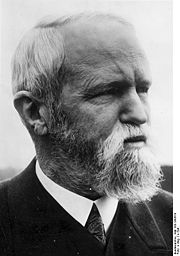
Gustav Frenssen
Encyclopedia

Gustav Frenssen was a German
Germany
Germany , officially the Federal Republic of Germany , is a federal parliamentary republic in Europe. The country consists of 16 states while the capital and largest city is Berlin. Germany covers an area of 357,021 km2 and has a largely temperate seasonal climate...
novelist. He wrote patriotically about his native country and promoted Heimatkunst (regionalism
Regionalism (literature)
In literature, regionalism or local color refers to fiction or poetry that focuses on specific features – including characters, dialects, customs, history, and topography – of a particular region...
) in literature.
Biography
Frenssen was born in the village of BarltBarlt
Barlt is a municipality in the district of Dithmarschen, in Schleswig-Holstein, Germany....
, in Schleswig-Holstein
Schleswig-Holstein
Schleswig-Holstein is the northernmost of the sixteen states of Germany, comprising most of the historical duchy of Holstein and the southern part of the former Duchy of Schleswig...
. He was educated at the universities of Tübingen, Berlin
Humboldt University of Berlin
The Humboldt University of Berlin is Berlin's oldest university, founded in 1810 as the University of Berlin by the liberal Prussian educational reformer and linguist Wilhelm von Humboldt, whose university model has strongly influenced other European and Western universities...
and Kiel
University of Kiel
The University of Kiel is a university in the city of Kiel, Germany. It was founded in 1665 as the Academia Holsatorum Chiloniensis by Christian Albert, Duke of Holstein-Gottorp and has approximately 23,000 students today...
. He took orders and from 1892 to 1902 was pastor
Pastor
The word pastor usually refers to an ordained leader of a Christian congregation. When used as an ecclesiastical styling or title, this role may be abbreviated to "Pr." or often "Ps"....
at Hemme
Hemme
Hemme is a municipality in the district of Dithmarschen, in Schleswig-Holstein, Germany....
, taking his degree as doctor of theology at Heidelberg in 1903. But he had already for some years been known as a writer of novels, and in 1902, a year after his great success with Jörn Uhl (1901), he gave up his pastorate and devoted all his time to literature.
In his later years he abandoned Christianity because Christian morals were in conflict with his blatant racism
Racism
Racism is the belief that inherent different traits in human racial groups justify discrimination. In the modern English language, the term "racism" is used predominantly as a pejorative epithet. It is applied especially to the practice or advocacy of racial discrimination of a pernicious nature...
. Instead, he turned to a form of Germanic Neopaganism
Germanic Neopaganism
Germanic neopaganism is the contemporary revival of historical Germanic paganism. Precursor movements appeared in the early 20th century in Germany and Austria. A second wave of revival began in the early 1970s...
which also suited his liberal views on sexuality.
Writings
- Dorfpredigten ("Village Sermons", 1899–1902; Vandenhoed & Ruprecht, Göttingen; the 1900 cover page indicates that he was pastor in Hemme, Holstein)
- Jörn Uhl (1901)
- Die Sandgräfin (1895, 3rd ed. 1902)
- Die drei Getreuen (1898)
- Das Heimatsfest, a play (1903)
- Hilligenlei ("Holyland", 1905)
- Peter Moor's Fahrt nach Süd-West (1906)
- Klaus Henrich Baas (1909)
- Sönke Erichsen, a play (1912)
- Die Brüder (1918)
- Der Pastor von Poggsee ("The Pastor of Poggsee", 1921)
- Otto Babendiek ("The Anvil")
- Grübeleien, observations (3 vols.)
- Recht
oder Unrecht: Mein Land, a defense of Germany's actions in World War IIWorld War IIWorld War II, or the Second World War , was a global conflict lasting from 1939 to 1945, involving most of the world's nations—including all of the great powers—eventually forming two opposing military alliances: the Allies and the Axis...
("Rightor Wrong: My Country," the title is also a popular saying, cf. patriotismPatriotismPatriotism is a devotion to one's country, excluding differences caused by the dependencies of the term's meaning upon context, geography and philosophy...
; 1940)

